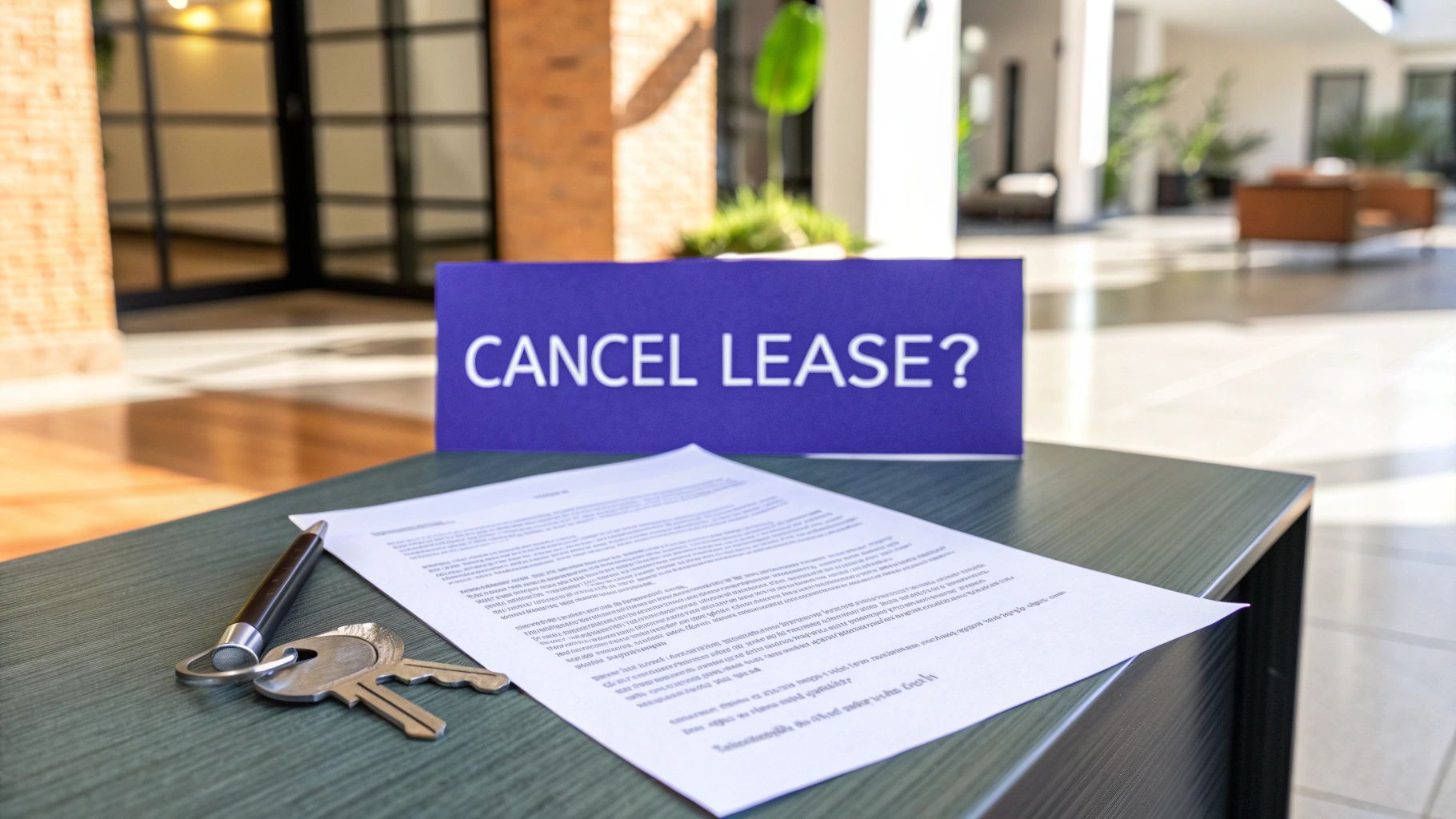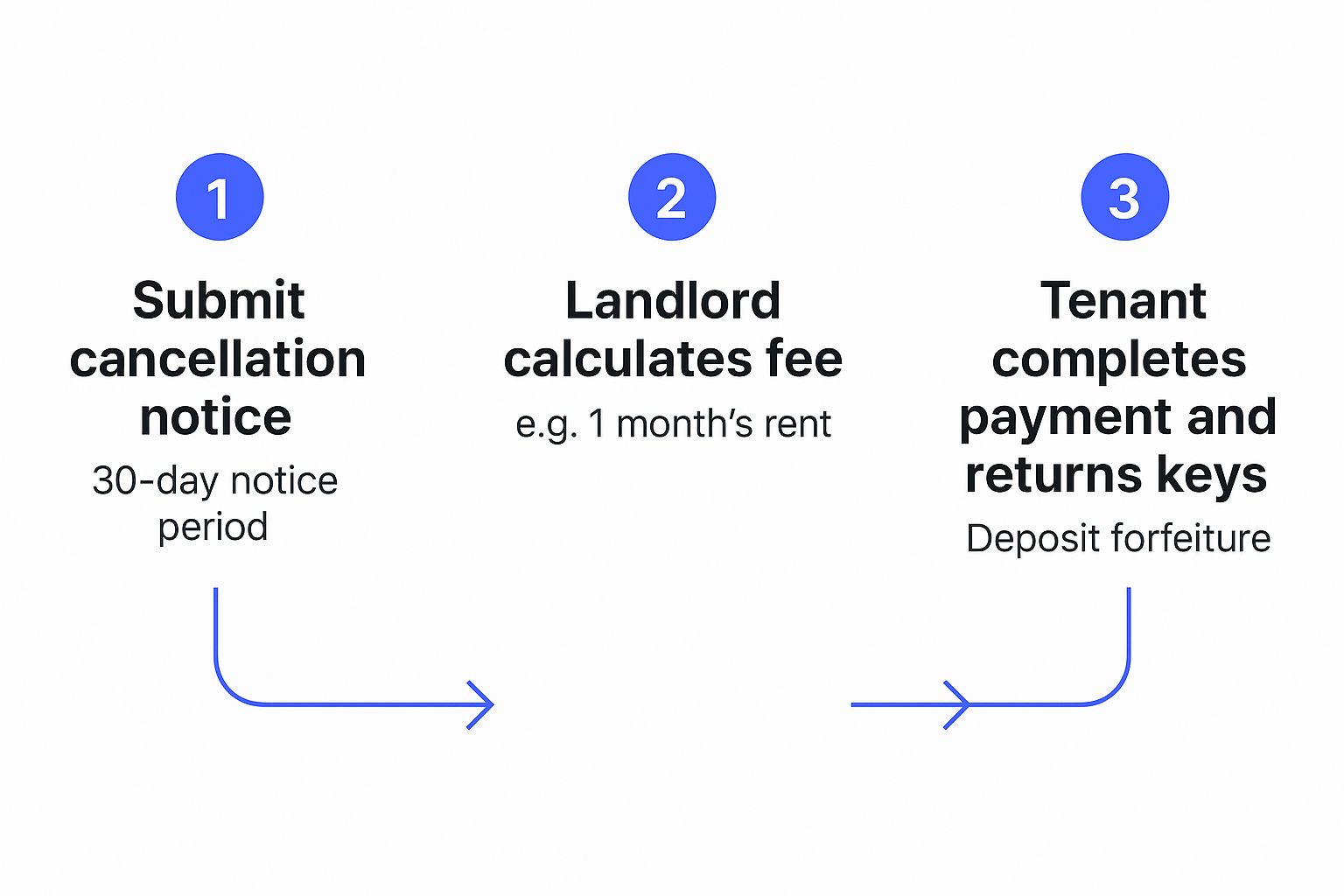
So you signed a lease but haven't moved in yet, and now you need to back out. Can you do it? The short answer is yes, but it’s almost never a clean break. The minute you and the landlord both sign that lease, it becomes a legally binding contract. Move-in day doesn't magically activate it—it's live from the moment of signing.
While you definitely have options, they almost always come with some kind of financial or legal string attached.
Understanding Your New Legal Reality

It’s a classic, costly mistake: assuming a lease has a "grace period" or only kicks in once you get the keys. This just isn't true. Once your signature is on the page, you're locked into the agreement and legally obligated to follow its terms.
This means a simple change of heart won't let you walk away scot-free. From the landlord's perspective, they've held up their end of the bargain by taking the property off the market for you. They can now rightfully claim damages for any losses they face because you’ve backed out.
What Determines Your Options?
Your ability to cancel a lease before moving in really boils down to a few key things. Getting a handle on these will help you figure out the best way to move forward.
- The Lease Itself: Dig out your copy and look for an "early termination" or "rescission" clause. If one exists, you're in a much better position.
- State and Local Laws: Landlord-tenant laws are all over the map. Your local regulations might offer specific protections or lay out the exact steps you need to follow.
- How Quickly You Act: Time is not on your side. The faster you let your landlord know, the better. It shows good faith and gives them a fighting chance to find a new tenant, which could seriously reduce what you owe.
The most crucial takeaway is this: a signed lease isn't just a placeholder; it's a real financial and legal commitment. How you handle the next steps can make all the difference to your bank account and your rental history.
The specific factors in your situation will shape the outcome, but a few core principles always apply. The table below breaks down the most critical elements that will influence your cancellation options.
Key Factors That Determine Your Cancellation Options
| Factor | What It Means for You | Potential Impact |
|---|---|---|
| Lease Language | The contract might have a built-in "early termination" or "rescission" clause that outlines the exact steps and penalties for canceling. | If a clause exists, it provides a clear (though likely costly) path to exit the lease. If not, you'll be negotiating from scratch. |
| State/Local Laws | Your jurisdiction may have specific landlord-tenant laws that grant tenants certain rights to cancel or limit what a landlord can charge. | These laws can provide protections that aren't in your lease, like setting a cap on penalties or defining the landlord's duty to mitigate. |
| Timing of Notice | The amount of time between your cancellation notice and the start date of the lease is critical. | More notice gives the landlord more time to re-rent, which can significantly reduce or even eliminate your financial liability for lost rent. |
| Landlord's Duty to Mitigate | Most states require landlords to make a reasonable effort to find a new tenant rather than just letting the property sit empty and billing you. | This legal duty prevents the landlord from charging you for the full lease term if they can find a replacement tenant relatively quickly. |
Ultimately, the landlord has a right to be compensated for their losses, but they also have a legal responsibility to minimize those losses—a concept known as the "duty to mitigate." This means they can’t just let the apartment sit vacant for a year and send you the bill. They have to actively try to re-rent it. Successfully navigating this requires clear, honest, and immediate communication.
Digging Into Your Lease to Find an Early Exit
That stack of paperwork you signed? It's time to treat it like your best friend. Before you do anything else, grab the lease agreement and a highlighter. The answer you're looking for might be hiding in plain sight.
Think of it as a fact-finding mission. You're searching for specific clauses or language that could give you a clean break before you even move in.
Specific Clauses to Hunt For
You'll need to carefully scan the entire document for anything related to ending the agreement early. Some leases are surprisingly flexible, and you might find one of these golden tickets:
- Early Termination Clause: This is your clearest path out. It will spell out exactly what you need to do and what it will cost, which is often a fee equal to one or two months' rent.
- Rescission Period: While not common in rental agreements, some contracts have a "cooling-off" period. This gives you a few days to back out without any penalty. It's a long shot, but absolutely worth checking for.
- Contingency Clauses: Was your lease dependent on something else falling into place? Maybe it was contingent on you landing a specific job or your financing coming through by a certain date. If that condition wasn't met, the lease might be void.
The legal language here can be thick. If you spot a clause that seems promising but you're not 100% sure what it means, get a second opinion. Misinterpreting legal text is an expensive mistake you don't want to make.
Of course, many standard leases are written to protect the landlord and won't include these convenient escape hatches. If you come up empty-handed, don't lose hope. It just means your next move will focus less on the contract itself and more on local landlord-tenant laws and good old-fashioned negotiation.
For a deeper dive into how different legal systems handle these issues, resources with details on Dutch rental contracts offer a great perspective. Understanding these frameworks can give you a better sense of any contractual leverage you might have, no matter where you're located.
Understanding the True Cost of Backing Out

So, you’ve signed a lease but your plans have changed. It happens. But backing out of a legally binding contract before you even move in is almost never a clean, cost-free break.
The moment you tell your landlord you're canceling, you're stepping into a world of potential financial and legal headaches. It’s absolutely critical to understand what’s at stake before you make that call.
The first hit you’ll feel is usually to your wallet. The landlord took their property off the market because of your commitment, and they’re entitled to be compensated for their losses. This can play out in a few ways, and nearly all of them will leave your budget much lighter than you planned.
Common Financial Penalties
When you try to cancel a lease before it starts, expect to face at least one of these costs:
- Forfeiture of Your Security Deposit: This is often the first thing to go. Landlords typically keep the deposit to cover the immediate expenses of re-listing the unit and to offset some of the lost rent.
- A Lease Termination Fee: Many leases have a specific "buyout" clause. This could be a flat fee or, more commonly, an amount equal to one or two months' rent.
- Responsibility for Rent: This is the big one. You could be legally on the hook for rent until the landlord finds a new, qualified tenant. If your rent is $2,000 and it takes them two months to fill the spot, you could owe a staggering $4,000.
Thinking you can just walk away without paying is a serious miscalculation. A signed lease gives the landlord legal grounds to pursue you for these costs, which can quickly escalate if they involve collection agencies or legal action.
The Long-Term Damage
Beyond the immediate financial sting, the fallout can follow you, making it harder to find housing in the future. An early lease break—even before you unpack a single box—can create a lasting negative mark on your record that’s tough to erase.
The potential for long-term damage is very real. Breaking a lease can lead to negative marks on your credit report and turn future rental applications into an uphill battle. According to Experian, landlords often see a history of broken leases as a major red flag, influencing over 35% of rental decisions. This means you’re not just dealing with immediate costs, but with reputational damage that can haunt you for years. You can learn more about how a lease termination can affect your credit on their blog.
This decision carries weight. A damaged rental history can make other landlords hesitant to rent to you, potentially pushing you toward less desirable properties or forcing you to pay a much larger security deposit to offset their perceived risk. Fully grasping these consequences is essential before you make a final choice.
How to Talk to Your Landlord About Canceling
How you communicate your decision can make all the difference. When you need to cancel a lease before it even starts, your best bet is to approach your landlord professionally and cooperatively. This isn't just about being polite; it's a strategic move.
The very first thing you need to do is provide immediate, honest communication—and make sure it's in writing. A phone call won't cut it for the official notice. An email or a certified letter gives you a time-stamped paper trail, which is absolutely crucial. Explain your situation calmly and clearly, transforming what could be a tense conversation into a problem-solving session.
Setting a Cooperative Tone
Frame the conversation around finding a solution that works for both of you. Instead of demanding to be released from the lease, ask how you can work together to minimize their financial hit. This approach shows you're a responsible partner, not an adversary looking for a fight.
Here are a few negotiation points you can bring to the table:
- Offer to find a replacement tenant: This is a big one. Propose marketing the property yourself and even screening potential applicants to present to the landlord.
- Suggest a buyout: You could offer to pay a one-time fee, maybe one month's rent, to terminate the agreement cleanly and part ways.
- Acknowledge their position: A little empathy goes a long way. Show them you understand that your change of plans has put them in a tough spot.
The infographic below illustrates a common path to resolving a lease cancellation once notice is given.

As you can see, a structured process—often involving a pre-agreed fee—can lead to a straightforward resolution without escalating the situation.
Keep in mind that policies for early termination can vary dramatically. For example, in the UK, it's common for break fees to be anywhere from one to three months' rent, depending on the specifics of the lease. For more detailed strategies on this topic, you might find our guide on how to terminate a lease early helpful.
When the Law Is on Your Side to Cancel a Lease
While most lease cancellations end up in a negotiation with some costs involved, there are specific situations where you have a legal right to walk away, penalty-free. Think of these less as loopholes and more as legally protected circumstances where the landlord hasn't held up their end of the bargain.
One of the most common scenarios is when the property isn't ready or habitable on your move-in date. Imagine showing up with a moving truck only to find the unit is still a construction zone or, worse, it fails a mandatory health and safety inspection. When this happens, the landlord has breached the lease agreement, giving you solid grounds to terminate it.
Documenting a Breach of Contract
If you find the property is uninhabitable, your immediate next step is to gather undeniable proof. Vague complaints just won't cut it in a legal dispute; you need to build a solid, evidence-based case.
- Take Photos and Videos: Document absolutely everything. Get clear shots of the ongoing construction, any safety hazards, or whatever conditions make the place unlivable.
- Get It in Writing: All communication with your landlord from this point forward should be in writing, preferably email. This creates a paper trail of the problems you've reported and your requests for a resolution.
- Official Reports: If an inspector has deemed the property unfit for occupancy, that official report is your most powerful piece of evidence.
Another legally protected situation is if the landlord seriously misrepresented the property. For example, if the listing advertised a two-bedroom apartment but you discover it's actually a one-bedroom, or if key amenities they promised simply don't exist, you can argue the contract is void due to misrepresentation.
Remember, the burden of proof is on you. Without clear, documented evidence that the landlord failed to deliver a safe, habitable home as promised, it just becomes your word against theirs.
Special Protections for Military Personnel
For those serving in the military, the Servicemembers Civil Relief Act (SCRA) offers some powerful protections. If you're an active-duty member and you sign a lease but then receive official orders for a permanent change of station (PCS) or to deploy for 90 days or more, you can legally terminate your lease.
To do this, you'll need to provide your landlord with a written notice along with a copy of your official orders.
Understanding all the nuances of when you can legally canceling a lease after signing is a complex but crucial topic. Our related guide dives into even more detail.
Common Questions About Canceling a Lease Early

It’s completely normal to have a ton of questions when you’re thinking about canceling a lease. The whole process can feel like a maze, but getting clear answers is the best way to move forward with confidence.
Let's tackle a big one first: Does a "3-day right to cancel" apply to leases? This is a really common misconception. That "cooling-off" period you hear about is usually for specific consumer sales, but rental leases are almost always excluded. The second you sign that paper, it’s a legally binding contract.
So what happens if you just decide not to move in and ghost the landlord? This is the absolute worst thing you can do. Your landlord can legally sue you for every penny of rent owed under the lease. They can also send your account to collections and report the unpaid debt to credit bureaus, which will tank your credit score and rental history for years.
What About My Security Deposit?
This is the million-dollar question, isn't it? Whether you get your security deposit back is a tricky one, and it all comes down to your specific lease and local landlord-tenant laws. Many agreements will state flat-out that the deposit is forfeited if you back out before moving in.
But there's a flip side. If your landlord finds a new, qualified tenant right away and doesn't lose any money, you have a solid case for getting it back. This is tied to the landlord's "duty to mitigate" damages—they have to make a reasonable effort to re-rent the place instead of just sitting back and billing you.
The global rental market has seen a rise in pre-tenancy cancellations, especially in major urban centers. Research reveals that roughly 40% of tenants who break leases early receive negative marks on their rental history, which can impact their ability to secure housing for up to five years. For more on this, you can discover insights about rental history impacts from Precision Appliance Leasing.
For a deeper dive into all your options, be sure to check out our complete guide on how to break a lease.
At Legal Document Simplifier, we turn dense, confusing legal contracts into summaries you can actually understand. Upload your lease today and get the clarity you need to make your next move with confidence. Simplify Your Legal Documents Now.